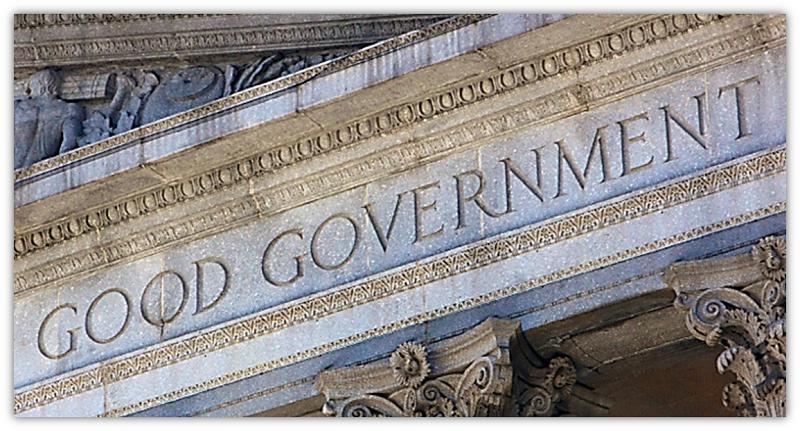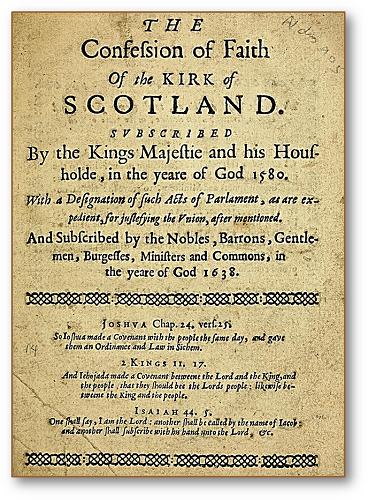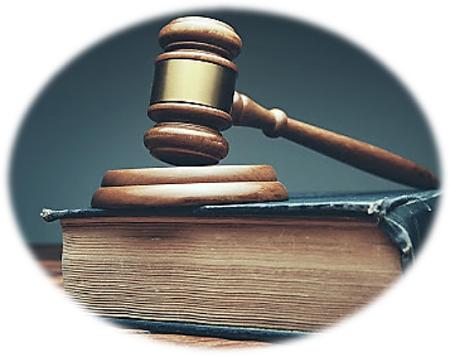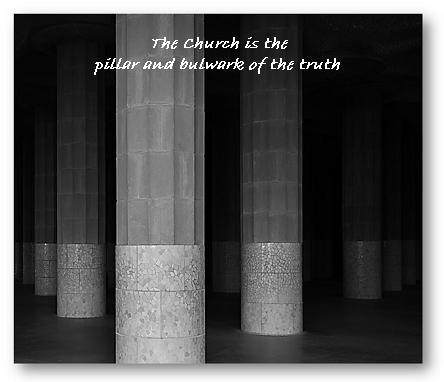The Task of the Government Today
The Task of the Government Today

Some Introductory Remarks⤒🔗
The present times provoke many questions about the task and role of government. These questions are prompted especially by moral issues. When there are matters that need to be resolved, a government seems virtually paralyzed, and when it eventually moves, the state generally grants even wider freedoms in the name of toleration and equal rights. As a result we see a steady erosion of values which our country has traditionally enjoyed. Abortions are becoming more and more readily available in an indiscriminate manner, often even in violation of the law. Governments are not eager to enter the fray. Legislation designed to protect the Sunday as a day of rest and worship is either ignored or challenged in the courts, and governments are very reluctant to get too involved. What can or what must the state do in these and related issues? What is the proper role of government?
In this introduction, let us look in a preliminary way, first of all, at Art. 36 of our Belgic Confession, secondly at toleration, then at some Biblical principles, and finally at two current examples followed by some concluding remarks.
Art. 36 of the Belgic Confession←⤒🔗
In Art. 36 of the Belgic Confession we confess what we believe concerning the civil government. The first paragraph reads as follows:
We believe that, because of the depravity of mankind, our gracious God has ordained kings, princes, and civil officers. He wants the world to be governed by laws and policies, in order that the licentiousness of men be restrained and that everything be conducted among them in good order. For that purpose He has placed the sword in the hand of the government to punish wrongdoers and to protect those who do what is good. Their task of restraining and sustaining is not limited to the public order but includes the protection of the Church and its ministry in order that (all idolatry and false worship may be removed and prevented, the kingdom of antichrist may be destroyed) the kingdom of Christ may come, the Word of the gospel may be preached everywhere, and God may be honoured and served by everyone, as He requires in His Word.
The words I have placed in brackets were deleted by the General Synod 1905 of the Gereformeerde Kerken in Nederland as not belonging to the task of government.

It is not my intention (nor would it be possible) to enter now into all the aspects of the controversy that has surrounded the elimination of these words. It is, however, important that we understand why the words were removed from the text so that we can better appreciate some of the issues involved.1 Art. 36 as written by Guido de Bres must be seen against the background of its times. First written in 1561, this confession originated at a time when all of society in Western Europe was considered Christian and there was no clear demarcation between the duties of the state and the church (the so-called Corpus Christianum). Such a situation prevailed for over a thousand years and was considered normal. One result of this state of affairs was that there was wide agreement in considering one of the most important tasks of the state to be the maintenance of true religion and the Church of Christ. Indeed, F. Wendel, in his well-known work, Calvin: The Origin and Development of his Religious Thought, can write with some justification that "Calvin was convinced and all the Reformers shared this conviction, that it was the duty of a Christian magistrate to put to death blasphemers who kill the soul, just as they punished murderers who kill the body" (p. 97). Calvin's active involvement for the execution of the heretic Servetus is a well-known example of how Calvin was a child of his times in this respect. In a treatise written after the execution, he vigorously defended that it was just to put heretics and blasphemers to death since God required it.2 Although Calvin himself never included the magistrate's duty of eradicating false religion in his confessional formulations, other Reformed confessions did. The Scottish Confession of Faith (1560) speaks of the civil magistrate in chapter 24:
...Moreover, we state that the preservation and purification of religion is particularly the duty of kings, princes, rulers and magistrates. They are not only appointed for civil government but also to maintain true religion and to suppress all idolatry and superstition. This may be seen in David, Jehoshaphat, Hezekiah, Josiah and others highly recommended for their zeal in that cause.3
In the Second Helvetic Confession of 1566, we read in Art. 30 about the magistrate that he "roots out lies and all superstition, together with all impiety and idolatry and defends the Church of God," and, referring to the sword of Romans 13:4, says later in the same article: "...let him draw this sword of God against all malefactors, seditious persons, thieves, murderers, oppressors, blasphemers, perjured persons, and all those whom God has commanded him to punish and even to execute. Let him suppress stubborn heretics..."4 In this light, Art. 36 of our Belgic Confession must also be understood when de Bres wrote that "their (civil government's – CVD) task of restraining and sustaining is not limited to the public order but includes the protection of the sacred ministry in order that all idolatry and false worship may be removed and prevented, the kingdom of the anti-Christ may be destroyed and the Kingdom of Christ may come..."
How was this task of the government justified? Can it be justified? As can be seen from the Scottish Confession of Faith just quoted, this task of the civil authorities was derived from the Old Testament. This was also the case in the Belgic Confession. In the text of Dordrecht 16195 the Scripture passages referred to in Art. 36 refer, among others, to 1 Kings 15:12 (Asa's removal of male cult prostitutes and idols from the land) and 2 Kings 23 (Josiah's reforms including the slaying of the priests of the high places in Samaria).
There are, however, great difficulties with this approach, for one cannot equate the special position of Israel's theocratic kings with rulers of our present age. This equation obliterates the vast differences between Israel's identity as church and state at one and the same time and the justified separation of what is church and civil government in the present dispensation. Today no nation can be identified as the special people of God, His Church. No ruler today therefore stands in the same position as the Davidic kings who could be actively involved in the worship of God by Israel and its reformation. (David, e.g., was instrumental in liturgical matters, 1 Chronicles 23-25; helped prepare for the building of the temple, 1 Chronicles 29, which was built and dedicated by Solomon, 2 Chronicles 3-6; think also of the reformation under, e.g., Josiah, 2 Kings 23.) The office of the Davidic kings spoke of and pointed to the great King Jesus Christ (cf., e.g., Psalm 2; also how Solomon sat on the LORD'S throne; 1 Chronicles 28:5, 29:23). Whereas in Israel, church and state were one, so that church discipline was at the same time a civil matter involving even the use of the death penalty (e.g., for dishonouring parents, Deuteronomy 21; 20ff., or adultery, Leviticus 20:10), today the civil authorities have no Biblically justifiable right to take life as part of the process of church discipline. The spiritual discipline of the church by the sword of the Spirit, the Word of God (Ephesians 6:17; Hebrews 4:12-13; 2 Corinthians 10:4) is to be distinguished from civil punishment which can involve the taking of human life for capital offences (Romans 13:4). Besides appealing to the Old Testament and equating the situation then with the present age, Calvin and others also sought justification from the New Testament. Such they found in Luke 14:23. In the parable of the great banquet the master tells the servant to "go out to the highways and hedges and compel people to come in, that my house may be filled." Calvin agreed with Augustine's exegesis that this passage proves "that godly princes may lawfully issue edicts, for compelling obstinate and rebellious persons to worship the true God and to maintain the unity of the faith... "6 This parable, however, indicates that when those who had first been invited did not want to come, then they were not forced. Rather, others were invited from the streets and lanes of the city. And when there was still room, then the servant had to go out to the highways and hedges in order that those people, who lived there unsheltered, be urged, compelled, to come, because they would not dare to come since they considered themselves unworthy of such an honour. No use of outward force is referred to here. References to the punishment of Ananias and Sapphira (Acts 2) and the delivery of Hymenaeus and Alexander to Satan (1 Timothy 1:20) are not convincing either for justifying government prosecution of heretics.

Indeed, it can be argued that there are indications in the New Testament arguing against such a use of the sword. For example, to Pontius Pilate the Lord Jesus said: "My kingdom is not of this world; if my kingdom were of this world, my servants would fight, that I might not be handed over to the Jews; but my kingdom is not of this world." (John 18:36; also see. e.g., Luke 9:51-55.) The power of the kingdom of God is the gospel (cf. Romans 1:16). Faith overcomes the world, not the sword (1 John 5:4; cf. Zechariah 4:6).
The deletion of the phrase "all idolatry and false worship may be removed and prevented, the kingdom of antichrist may be destroyed" (as belonging to the task of government) was thus justified. However, where does this leave us with respect to the task of government over against the church? Does this imply that the state can tolerate what the church can not? These questions can be multiplied. It may be instructive to consider some Biblical data in this connection and to look first at the matter of toleration.
Toleration←⤒🔗
Because Israel as a nation was the covenant people of God, all who lived in her midst, including strangers and sojourners, were expected to obey the same laws, as given by God to Moses. (See, e.g., Exodus 12:19, 48ff. Leviticus 16:29-31; 17:8-16; 20:2-5; 24:16; Numbers 15:15ff; 19:10.) There was no room for arbitrary self-willed religion. No room for tolerating uncleanness in a land that was to be holy to God (cf. Psalms 78:54; Zechariah. 2:12). In light of this, it is noteworthy, that there was no law instructing the authorities to urge strangers to become believers. No such coercion was exercised. (How differently, well-meaning but mistaken Christian rulers later sometimes acted.) Of course, proselytes were heartily welcomed and after circumcision could also partake of the Passover (Exodus 12:48), but nowhere do we read of pressure being exerted here by civil authorities so that converts be won for the LORD. This was not their duty.
Perhaps it is with this in mind that we should consider the rule of David over territories conquered outside Canaan. He had subdued and placed under his authority Moab, the Aramaean kingdoms of Hadadezer (Damascus and Maacah), Edom and the Ammonites (2 Samuel 8:2-14; 10:6-19; 12:26-31), yet there is nowhere any hint that he worked so that "all idolatry and false worship may be removed and prevented." (There was such a command for Canaan, Deuteronomy 7; cf. 2 Samuel 5:21 and 1 Chronicle 14:12.) Also no special attempt was made to make them worshippers of the true God. Since his office as godly king over these gentile peoples is most parallel to the office of government today, this attitude – let us call it tolerance – points to a principle that can be important for discerning how the task of government should be perceived today.
That a government tolerates false religion (because it is not in its jurisdiction to fight heresy with the sword) is not in disagreement with Scripture. In this connection reference has been made to Matthew 7:12: "Whatever you wish that men would do to you, do so to them..." If one asks freedom of worship for himself, he should also grant it to others. After all, in God's long-suffering, the good grain as well as the weeds are allowed to grow together, until the time of harvest, when God himself will separate the two (Matthew 13:36-43).7 From the above, it can be concluded that government can tolerate what a church cannot and may not countenance.
At this point it can be noted that when European society was no longer united in the Roman Catholic Church, then the toleration of each other gradually grew out of necessity, if only to safeguard the stability of the state.8 It was not a conviction that came in the first place from Scripture, but it did find Scriptural support, as has just been noted. Although we have seen how Calvin was a child of his times in his view of capital punishment (by the state) for heretics, yet it was Calvin's insistence that both church and state have their own authority and neither must rule over the other that had implications leading to toleration. Calvin's conviction that the church be free and independent meant in practice that in countries where the Calvinist Reformation took a firm hold, the state was forced to define and set a limit to its powers. The basis was thus laid for spiritual and political freedoms which the state did not grant, but recognized.9 It is important to recognize that toleration as it developed in the sixteenth century is of a different origin and spirit from the toleration of which we hear all around us today. Whereas the early toleration was a result of the Reformation and the practical need to distinguish clearly between the different tasks and positions of church and state, toleration in our secular society is rooted in the autonomous man of the eighteenth century Enlightenment who claims to have all types of rights (e.g., right to abortion, gay rights, etc.). What now is the task of government today in a pluralistic and secular society with respect to these ungodly "rights"?

Some Biblical Principles←⤒🔗
Before we deal with the present situation, we need to turn again to the Scriptures, for God's Word teaches us certain basic truths that are of utmost importance in this context.
In the first place, God created heaven and earth. As Creator He is sovereign, and not the people or any government. God's rights come first, and not whatever man may imagine his rights to be. To God rulers and government are therefore responsible first of all, and only then to the people.
In the second place, the governing authorities as instituted and ordained by God are servants of God (Romans 13:1-7). Thus, as has already been implied, they are bound by the norms of God's law – insofar as the state has jurisdiction and competence. For example, the state cannot compel "that I rightly come to know the only true God, trust in Him alone, and submit to Him with all humility and patience" (Heidelberg Catechism on the First Commandment). However, the true God is to set the norms and goals of government. Government has to reckon with the First Commandment! Another example is the Eighth Commandment. Before the new version of the Catechism was adopted, Question and Answer 110 read: "God forbids not only such theft and robbery as are punished by the magistrate, but also..." A distinction is made between what government can do and cannot do. So government is to rule according to God's law according to the competence God has given it. Indeed, all people are to be subject to God's law. "Fear God and keep His commandments for this is the duty of all men" (Ecclesiastic 12:13).
In the third place, also unbelieving and ungodly governments are used by God to maintain justice and righteousness, to preserve the peace and thus also to protect "the church and its ministry in order that the kingdom of Christ may come, the Word of the gospel may be preached everywhere, and God maybe honoured and served by everyone" (Art. 36 of the Belgic Confession). This is already evident from Romans 13:4 where the pagan Roman authorities who are a terror to bad conduct are called God's servant for the good of the church. It is also clear whenever the ruling authorities acted justly and so in effect promoted the wellbeing of the church. For example, when Claudius Lysius prevented Paul from being killed by the Jews, he honoured Paul's civil rights and in the process was of great service to the church who retained this apostle (Acts 23:12-35). Christians are therefore exhorted to pray for all those in high authority, "that we may lead a quiet and peaceable life, godly and respectful in every way" (1 Timothy 2:2).
In the fourth place, the authority of civil government is limited. We have already seen this earlier, but here should be stressed what Calvin insisted on, namely, that church and state have their own jurisdiction, and neither must rule over the other.
Calvin speaks of a "twofold government in man: one aspect is spiritual, whereby the conscience is instructed in piety and in reverencing God; the second is political, whereby man is educated for the duties of humanity and citizenship that must be maintained among men. These are usually called the "spiritual" and the "temporal" jurisdiction ... by which is meant that the former sort of government pertains to the life of the soul, while the latter has to do with the concerns of the present life... The former resides in the inner mind, while the latter regulates only outward behaviour. The one we may call the spiritual kingdom, the other, the political kingdom." Calvin, Institutes,
III , xix, 15 [Battle's edition]

This limit to civil authority can explain why David apparently did not force the true worship of the LORD in conquered territories outside the land inhabited by the twelve tribes. There is, politically speaking, religious liberty. This is a very important principle. It has given and still gives room, so to speak, for Christ's work of gathering His Church. The government has to see to it "that not a single religious, political or social organization exerts spiritual pressure on public society."10
The Current Situation←⤒🔗
How do these principles function in our secular pluralistic society? To answer this question, let us briefly consider two examples. The first deals with abortion. I do not think that any of us question the fact that abortion is the unlawful taking of human life (cf., e.g., Psalms 139) and thus is murder. As such this is forbidden in the sixth commandment. The Scriptures make it very clear that government has a task to oppose and punish the unlawful taking of life.
Whoever sheds the blood of man, by man shall his blood be shed, for God made man in His own image.Genesis 9:6
The governing authority, as God's servant, "does not bear the sword in vain" (Romans 13:4). Government should therefore take all necessary measures to protect the life of the unborn. This, however, is not being done. There are of course difficulties here in our modern secular society. Government does not see itself as being God's servant and is thus easily swayed by vocal (minority) pressure groups that represent special interests such as liberalized abortions. There should be freedom in a pluralistic society, so goes the argument. However, on the point of abortion there can be no compromise or freedom. Too much is at stake. Life given by God is snuffed out unjustly. God's right to have this life protected must be acknowledged by the government. It is fully within their jurisdiction.
A second example is the government's task with respect to the fourth commandment. How far does the government's authority go here? Clearly the state cannot force and demand, for example, that people spend the Sunday in a Biblical way and hallow that day. That is beyond the competence and task of government. However, the state should promote rest on that day and it has the duty to see to it that public worship is possible. This obligation weighs all the heavier for political jurisdictions in a country like ours with a heritage which exhibited Christian values and indicated a knowledge of God's revelation, His Word. This fact puts a special onus on Canadian government to recognize its responsibility in the first place to the King of Kings and the Lords of Lords and in the second place to the (silent) majority of Canadians, who still call themselves Christian, be it nominally or out of conviction.
In 1985, the Lord's Day Act was tested in the Alberta Court of Appeal on the basis of the Canadian Charter of Rights and Freedoms (1981). Mr. Justice Belzil gave a dissenting judgment in which he wrote that Canada is part of Western civilization, moulded in and impressed with Christian values and traditions which still are a strong constituent element in the basic fabric of our society. Part of his judgment bears repeating:
I do not believe that the political sponsors of the Charter intended to confer upon the courts the task of stripping away all the vestiges of those values and traditions, and the courts should be most loath to assume that role. With the Lord's Day Act eliminated, will not all reference in the statutes to Christmas, Easter, Thanksgiving be next? ... Such interpretation would make of the Charter an instrument for the repression of the majority at the instance of every dissident and result in an amorphous, rootless and godless nation contrary to the recognition of the Supremacy of God declared in the preamble. The "living tree" will wither if planted in sterilized soil ... As much as it may be desirable and fair that all religious preferences be treated equally, there are times when that is not possible. The Lord's Day Act is an example. Civil authority, while bowing to pressure from religious groups, recognized the moral value of a day of rest. That it should have selected the day of the week regarded as holy by the great majority of Canadians is not inconsistent with the basic principles of democracy. That is political reality. Majority rule is restricted by the Charter only when it abridges or abrogates the guaranteed rights of others.

At the same time, the government has to reckon with the fact that today's society has a plurality of essentially conflicting religious outlooks. In seeking to fulfil its duty of preserving the civic peace, government will need to allow, for example, that it is possible for conscientious Jews to celebrate their Sabbath on Saturday. This can entail permitting their stores to be open on Sunday (provided they are closed on Saturday). Furthermore, in spite of our Christian heritage, civil government will also need to take into account the concrete reality of sin and growing secularization, so that "Sunday laws" remain enforceable and politically feasible. Something not completely unlike this principle is seen in the practice of divorce as recorded in Deuteronomy 24.
Christ says, "Moses permitted you to divorce your wives because of the hardness of your hearts; but from the beginning it was not so." Matthew 19:8
If Moses (yes, the Lord, who gave the law) had to reckon with the low level of Israel's spiritual life in the civil legislation of Israel, how much more government today.
This of course does not mean that government today should merely allow society to drift into pure secularization. Government should not fashion policy simply by following the latest public opinion polls, but government should provide leadership as God's servant, heeding the norms of His revelation and showing the country that such leadership and laws benefit society in its entirety. Our society is not ignorant of God's rights and will. Government has a holy obligation and responsibility in such a society to promote Biblical justice and righteousness (cf. Psalm 2:10-11). Much has been given to us as nation and much is therefore required. It is vital that the people of God remind and point governing authorities to this reality.
Concluding Remarks←⤒🔗
God has instituted civil government and to God government is responsible. Their office is ultimately to serve the glory of God and the coming of His Kingdom. Also for governments, the Word is to be a lamp before their feet, a light on their path (cf. Psalm 119:105). As God's servant, the civil authorities who are or are made aware of the demands of God, are obliged to promote Biblical justice and righteousness. That is surely the situation in Canada. The light of the Word of God should be used to show the way in the darkness of a vast array of issues and dilemmas of the day – moral, but also economic, education, health, labour and other issues.
However, even atheistic, revolutionary or pagan governments which are hostile to God or ignorant of His demands are God's servants. After all, God is sovereign and He works all things for the well-being of His people and the coming of His Kingdom through the Lordship of Jesus Christ. When government fulfils its basic office of working for external peace and civil order, it promotes the work of Jesus Christ. Then the gospel can be proclaimed, which is a crucial activity in this age.
Did Christ not say, "ALL authority in heaven and on earth has been given to Me. Go therefore and make disciples of all nations..." (Matthew 28:18ff.) and "this gospel will be preached throughout the whole world as a testimony to all nations; and then the end will come" Matthew 24:14

Church history is the focal point of world history. It is of great comfort to the church that all rulers stand under the authority of Jesus Christ. Even if there is persecution, the church can grow and increase. However, the church cannot grow where there is chaos and no order. Government must prevent such a chaos and guard society from dissolution. By so preserving the external civil peace, government serves the eternal peace that comes by means of the gospel proclamation.11
The government's office is specific and it is set off from other authorities in society. That means that in certain instances it can do what a church, for example, can never do. Government can tolerate false religion in view of its office of preserving the civil peace. The church can never do this, for she is the "pillar and bulwark of the truth" (1 Timothy 3:15). On the other hand, in other situations, government cannot do what is, however, within the authority of the church or of parents. For example, in this age, which tends at times to become rather obsessed with so-called women's rights, it is not unimaginable that government could be asked to legislate that it is unjust discrimination to bar women from the pulpit. A government that goes into such a matter transgresses its legitimate authority. Admission to the ministry of the Word is the prerogative of the church, not the state. Similarly government would have no business legislating in the name of anti-discrimination that non-Christians are able to teach in schools operated by parents from Canadian Reformed Churches. That is not within the government's jurisdiction, but the parents'.
Government has to know its place. It does not have absolute authority. That belongs to God alone.
His is the Kingdom and the power and the glory forever! That reality must never be forgotten.

Add new comment